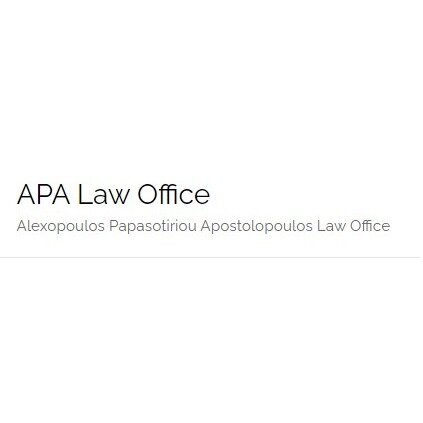Best Energy, Environment & ESG Lawyers in Greece
Share your needs with us, get contacted by law firms.
Free. Takes 2 min.
Or refine your search by selecting a city:
List of the best lawyers in Greece
About Energy, Environment & ESG Law in Greece
Energy, Environment, and ESG (Environmental, Social, and Governance) law in Greece encompass a wide range of legal frameworks regulating the production and consumption of energy, the protection and management of the environment, and compliance with modern corporate responsibility standards. Over the past decade, Greece has made significant progress in aligning its national policies with European Union directives, promoting investments in renewable energy, strengthening environmental regulations, and encouraging sustainable corporate practices. This evolving legal landscape offers many opportunities but also presents complex compliance requirements for both individuals and businesses.
Why You May Need a Lawyer
There are numerous situations where individuals, companies, and organizations may require legal guidance in matters related to energy, environment, and ESG in Greece. Some common scenarios include:
- Developing or investing in renewable energy projects, such as wind farms or solar parks, and navigating the permitting process
- Ensuring compliance with environmental regulations for industrial or commercial activities
- Responding to environmental impact assessments and managing public consultation processes
- Addressing allegations of pollution, waste management violations, or non-compliance with environmental standards
- Understanding and reporting ESG factors in line with Greek and EU legal requirements
- Participating in state-run energy auctions or securing licenses for energy generation or supply
- Dispute resolution regarding environmental damage, land use, or violations of energy or environmental laws
- Attending to due diligence and risk assessments in transactions or investments involving energy or natural resources
A specialized lawyer can help clarify obligations, navigate regulatory requirements, protect your interests during disputes, and ultimately ensure your activities are legally sound.
Local Laws Overview
Greek law in the field of energy, environment, and ESG is primarily shaped by the following legislative frameworks:
- Energy Law: Energy production and distribution is governed by national laws harmonized with EU regulations, particularly focusing on liberalization of the electricity and natural gas markets, licensing for renewable energy sources, energy efficiency, and state support schemes.
- Environmental Law: Environmental protection in Greece is based on EU directives and national laws covering environmental impact assessments, biodiversity, natural reserves, waste management, air and water pollution control, and climate change mitigation.
- ESG and Corporate Responsibility: ESG disclosure requirements stem both from European Union standards such as the Non-Financial Reporting Directive (NFRD) and local legislation. Greek companies, especially those listed on the Athens Stock Exchange, must report on their environmental and social practices and policies.
- Key Authorities: Regulatory bodies include the Regulatory Authority for Energy (RAE), the Ministry of Environment and Energy, the Hellenic Recycling Agency (EOAN), and several regional environmental agencies.
- Permitting & Compliance: Obtaining permits for energy projects and ensuring environmental compliance involve multiple steps, including environmental impact studies, public participation, and continuous monitoring.
Greek laws are regularly updated to reflect new EU policies and global sustainability trends, so staying informed and compliant can be challenging without specialized legal support.
Frequently Asked Questions
What is included under ESG legal requirements in Greece?
ESG legal requirements cover transparency and reporting in areas of environmental impact, social responsibility, and corporate governance. Companies must disclose relevant policies, risks, and activities as required by local and EU law.
What permits are needed for building a renewable energy project in Greece?
Typically, you need an environmental permit, a grid connection license, installation and operation licenses, and approvals from land use authorities. The exact requirements depend on the project’s size and location.
Who regulates the energy sector in Greece?
The Regulatory Authority for Energy (RAE) is the main authority, working alongside the Ministry of Environment and Energy and other specialized agencies.
How are environmental impact assessments conducted?
Projects likely to affect the environment require a formal Environmental Impact Assessment (EIA), including reporting potential impacts, engaging the public, and obtaining approval from the responsible authority before proceeding.
Are there incentives for renewable energy investments?
Yes, Greece offers incentives such as state aid schemes, guaranteed tariffs, and participation in renewable energy auctions to promote investment.
What regulations exist for waste management?
Greece has detailed waste management regulations, including obligations for proper disposal, recycling targets, and penalties for non-compliance, aligned with EU standards.
How can I resolve disputes over environmental damage?
Disputes can be resolved through administrative remedies, court proceedings, or alternative dispute resolution methods. Legal advice is crucial to determine the best course of action.
Is ESG compliance mandatory for all companies?
Not all companies have the same obligations. Large companies, listed entities, and those operating in regulated sectors face stricter requirements, while smaller firms may have fewer obligations but are encouraged to comply.
What is the role of public consultation in environmental matters?
Public participation is an integral part of the environmental permitting process. Residents and stakeholders can review and comment on significant projects’ environmental impact studies.
How often do environmental laws change in Greece?
Environmental regulations are frequently updated to remain in line with EU directives and international trends, making it essential to stay informed or seek professional guidance.
Additional Resources
If you need more information or wish to stay updated, you can refer to the following bodies and organizations:
- The Ministry of Environment and Energy: Oversees environmental policy, energy regulation, and natural resources
- The Regulatory Authority for Energy (RAE): Regulates and supervises the energy market
- Hellenic Recycling Agency (EOAN): Responsible for waste management and recycling
- Greek Ombudsman: Addresses citizen complaints regarding environmental and energy issues
- Local bar associations and chambers of commerce: Provide directories of specialized lawyers
- European Union official portals: Offer updates on relevant EU directives and initiatives
There are also non-governmental organizations working in environmental advocacy and renewable energy that may offer practical guidance and support.
Next Steps
If you believe you need legal assistance in Energy, Environment, or ESG matters in Greece, consider the following steps:
- Define your needs clearly - whether it is compliance advice, project development, permit applications, investment assessment, or dispute resolution
- Collect all relevant documents, contracts, and correspondence related to your issue
- Contact a lawyer or law firm with proven expertise in energy, environmental, and ESG law
- Consult local bar associations for lists of qualified legal professionals
- Stay informed by following updates from official authorities and regulatory agencies
Taking action early and working with a knowledgeable legal advisor can help you navigate complex regulations, avoid costly mistakes, and ensure your activities are compliant with all relevant laws.
Lawzana helps you find the best lawyers and law firms in Greece through a curated and pre-screened list of qualified legal professionals. Our platform offers rankings and detailed profiles of attorneys and law firms, allowing you to compare based on practice areas, including Energy, Environment & ESG, experience, and client feedback.
Each profile includes a description of the firm's areas of practice, client reviews, team members and partners, year of establishment, spoken languages, office locations, contact information, social media presence, and any published articles or resources. Most firms on our platform speak English and are experienced in both local and international legal matters.
Get a quote from top-rated law firms in Greece — quickly, securely, and without unnecessary hassle.
Disclaimer:
The information provided on this page is for general informational purposes only and does not constitute legal advice. While we strive to ensure the accuracy and relevance of the content, legal information may change over time, and interpretations of the law can vary. You should always consult with a qualified legal professional for advice specific to your situation.
We disclaim all liability for actions taken or not taken based on the content of this page. If you believe any information is incorrect or outdated, please contact us, and we will review and update it where appropriate.
Browse energy, environment & esg law firms by service in Greece
Greece Attorneys in related practice areas.
Browse energy, environment & esg law firms by city in Greece
Refine your search by selecting a city.

















